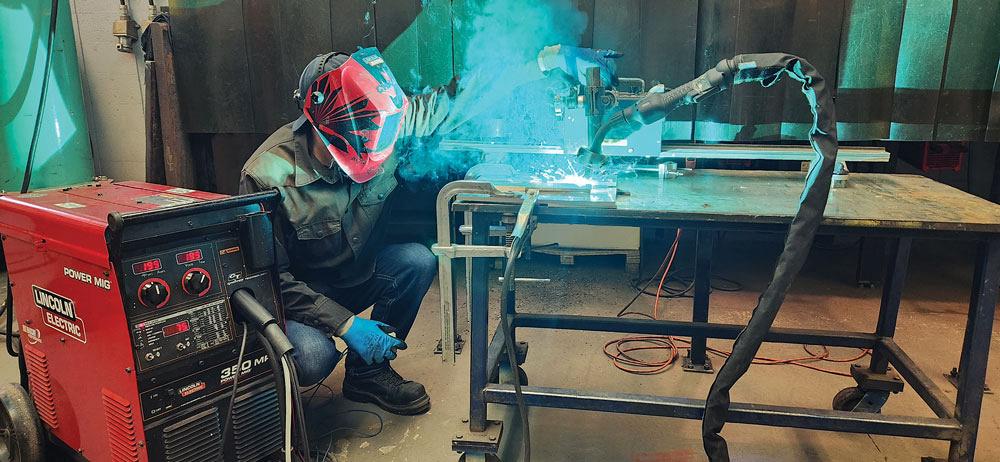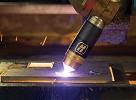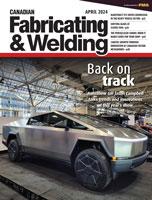Editor
- FMA
- The Fabricator
- FABTECH
- Canadian Metalworking
15 years of MaJIC
Innovation centre celebrates important milestone serving Canadian industry
- By Rob Colman
- January 24, 2024

Mikael Carriere, senior welding engineering technologist at MaJIC, performs maritime certification testing for a welding consumables manufacturer. MaJIC
During a Q&A session at this year’s CanWeld conference in Moncton, N.B., a number of attendees mentioned the fact that there’s a tendency in industry to keep operating the same way, sticking to the same welding procedures for many years, even as new equipment is purchased that can improve the operations and efficiency of a shop. Since making those changes can be time-consuming, this isn’t a complete surprise. However, there is external support for making such changes, it’s just a matter of reaching out to the right organization.
That’s where the Materials Joining Innovation Centre (MaJIC) fits in. MaJIC is a not-for-profit organization that provides certification testing, technical guidance, customized training, procedure development, and applied research for industry. In 2023, the centre celebrated its 15th year providing such support to organizations across Canada.
Hands-On Support
“MaJIC is an independent, not-for-profit innovation centre created to help companies compete in the global market,” said Jeff Molyneaux, executive director and CEO of MaJIC. “We have a test lab in Kirkland Lake, Ont., where we do all manner of mechanical and metallurgical testing associated with the welding industry. We help companies with everything from validating their welding procedures, performance qualifications and welder testing, to full procedure development and applied research.”
MaJIC runs with a full-time team of eight people, as well as about a half-dozen part-time experts.
“Our part-time employees are semi-retired individuals with many years of industry expertise behind them,” said Molyneaux. “All that historical knowledge and ingenuity is brought to support industry as a whole.”
Molyneaux noted that the way in which many companies first engage MaJIC is to qualify certain procedures in their manufacturing.
“It’s often just standard testing that first brings them in the door,” he said. “That can be the beginning and end of our interaction. But sometimes, companies will come in two or three times with the same procedure and fail each time. That’s where we can start working with them. We provide feedback and the welding engineering expertise to help them understand why their welds are failing—whether it’s simply a welder error or it’s in the recipe of the welding procedure itself.”
From there, the team can offer suggestions on how that company might improve its productivity.
“For instance, in October, Mikael Carriere, our lab supervisor, spent several days in Saskatchewan with a customer doing productivity work with them,” said Molyneaux. “He is looking at everything they do in-house and helping them to improve, rather than simply offering advice from a distance. He’s right there to look at welding parameters and evaluate whether or not they are optimal. Sometimes it’s valuable to be in the shop to make these changes. Welding operators are notorious for being knob fiddlers, adjusting settings to find their personal version of the ‘right settings.’ Those ‘right settings’ aren’t necessarily what they need to be, according to the welding procedure. That’s one area where we can work with companies to varying degrees.”
Innovation Enabler
MaJIC also gets involved in larger projects from the outset when a company wants or needs to reinvent a product but doesn’t have the in-house expertise or the procedures necessary to meet the requirements.
“We are currently preparing to work with a company that has received funding to green up its operations by lightweighting its product and improve its life cycle to be more energy efficient and longer lasting,” said Molyneaux. “It’s in this research and development capacity that I feel we can offer the greatest benefit to companies across Canada.”
Molyneaux prides himself on the diversity of equipment MaJIC has at its disposal to help businesses.
“Some labs have only one or two brands of equipment,” he noted. “That can be very important to a company using one particular brand of equipment in their shop. For instance, a number of years ago, we did some waveform development on a Fronius machine because that is what that manufacturer used in their facility. It would have been difficult to do that development on another brand of machine and then try to transfer that to the company’s preferred welding machine. We had a machine that was one generation apart from the machine they were using, but it was still essentially the same machine, so we could duplicate our efforts in their shop.”
College Connections
MaJIC was first conceived when progressive companies in the Kirkland Lake area asked Northern College instructors for help with R&D.
“The faculty wanted to help but there wasn’t a mechanism for them to do that,” said Molyneaux. “The founding of MaJIC created a bridge between industry and the college.”
The link between MaJIC and Northern remains strong.
“We are co-located with the Northern College and its school of welding engineering technology,” Molyneaux explained. “We have access to the students there, and the students have access to our equipment. Oftentimes we will support student research products with testing and expertise. We often hire students out of the program as interns and staff, so it’s a great relationship that we all benefit from.”
Looking to the Future
MaJIC’s reach extends to international companies as well. It often assists them in getting certified to CWB, AWS, or any other standard they might require to enter industry in Canada. Beyond welding, MaJIC offers comprehensive civil and architectural services, covering foundation designs, accessibility ramps, beam designs, home designs, and mechanical systems for individuals and businesses in Northeastern Ontario.
The centre’s critical role, though, remains the same—supporting innovation in Canada.
Reflecting on the success of MaJIC over the past 15 years, Molyneaux is proud that it has played such an important role in helping companies remain competitive.
“We have been very successful in doing that,” he said. “We existed before many other innovation centres were conceived, and we’ve helped strengthen that link between industry and the college system. And our reach has grown. When we first launched, I would say that about 85 per cent of the companies we worked with were in the mining industry and 90 per cent were based in northern Ontario. Since then, that percentage is probably closer to 50 per cent of our business. The rest is spread out across Canada, and our industry reach has grown to include many other industry sectors.”
Molyneaux encourages potential customers to see MaJIC as a safe third-party partner that can help their business take the next step.
“We are here to help in a non-competitive, confidential way to help you grow,” he said. “We’re here to help you become more competitive on the world stage. Anything that makes industry stronger in Canada is positive for us all.”
Editor Robert Colman can be reached at rcolman@fmamfg.org.
MaJIC, www.majic-ca.org
subscribe now


Keep up to date with the latest news, events, and technology for all things metal from our pair of monthly magazines written specifically for Canadian manufacturers!
Start Your Free SubscriptionAbout the Author

Rob Colman
1154 Warden Avenue
Toronto, M1R 0A1 Canada
905-235-0471
Robert Colman has worked as a writer and editor for more than 25 years, covering the needs of a variety of trades. He has been dedicated to the metalworking industry for the past 13 years, serving as editor for Metalworking Production & Purchasing (MP&P) and, since January 2016, the editor of Canadian Fabricating & Welding. He graduated with a B.A. degree from McGill University and a Master’s degree from UBC.
- Trending Articles
Aluminum MIG welding wire upgraded with a proprietary and patented surface treatment technology

Achieving success with mechanized plasma cutting

Hypertherm Associates partners with Rapyuta Robotics

Gema welcomes controller

Brushless copper tubing cutter adjusts to ODs up to 2-1/8 in.

- Industry Events
MME Winnipeg
- April 30, 2024
- Winnipeg, ON Canada
CTMA Economic Uncertainty: Helping You Navigate Windsor Seminar
- April 30, 2024
- Windsor, ON Canada
CTMA Economic Uncertainty: Helping You Navigate Kitchener Seminar
- May 2, 2024
- Kitchener, ON Canada
Automate 2024
- May 6 - 9, 2024
- Chicago, IL
ANCA Open House
- May 7 - 8, 2024
- Wixom, MI















